#Vue.js development companies
Explore tagged Tumblr posts
Text
The Top Vue Development Companies in the USA featured below are the best in terms of innovation, technical expertise, and client happiness. Choosing the appropriate Vue development firm is critical for producing scalable, efficient, and visually appealing apps that meet modern digital needs. Businesses that work with one of these reputable agencies can generate flawless web experiences that promote growth and engagement.
0 notes
Text
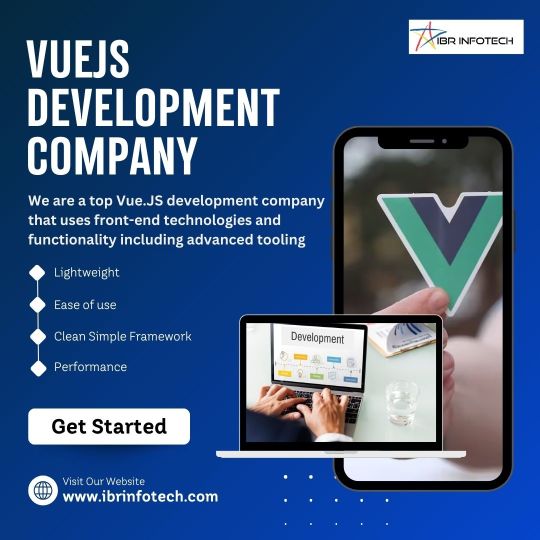
Discover the potential of Vue.js with IBR Infotech, the reliable companion for Vue.js excellence. As a prominent Vue.js development company, we specialize in creating dynamic and interactive web solutions that precisely match your business objectives. Our team of skilled professionals is committed to providing seamless integration and exceptional performance in every Vue.js project we handle. Let us bring your vision to life with captivating Vue.js applications that will captivate your audience.
#Vue.js development company#Vue.js development#Vue.js development services#Vue.js development solution#Vue.js development company in USA#Vue.js development company in UK#Vue.js development companies
0 notes
Text
#digital aptech#dapl#web development#web developers#mobile app development#web development services#web development company#angularjs development company#angular js development company#angularjs development services#ember#vuejs#vue.js
0 notes
Text
The web development progress is a double-edged sword. Countless libraries and frameworks give you freedom of choice, but sometimes such a variety confuses. To help you avoid this situation when choosing a library for building a web app UI, we decided to build a data dashboard for a web application, using React, Vue.js, and Webix and comparing the results.
#outsourcing#software development#web development#staff augmentation#custom software development#it staff augmentation#custom software solutions#it staffing company#it staff offshoring#custom software#webixcustomization#webix#react js#react.js#reactjs#vuejs#vue.js
0 notes
Text
Vue.js Development Services in Canada
Look no further if you're in search of top Vue.js developers. Devstree Canada stands out as the leading Vue.js development firm in Canada, offering unparalleled Vue.js Development Services worldwide. With our expertise and commitment to excellence, we ensure the success of your projects with innovative Vue.js solutions tailored to your needs.
WebPage | Vue.js Development Services
0 notes
Text
Top Vue.js Development Services
LevelUP is a renowned Vue.js development services company known for its expertise in creating highly responsive and dynamic web applications using Vue.js. With a team of experienced Vue.js developers, they offer customized solutions to businesses of all sizes. We provide highly skilled Vue.js developers on a freelance or project basis, making it easier for companies to find the right talent. These companies have a strong reputation for delivering high-quality Vue.js development services. To know more kindly visit https://thelevelup.team/hire-vue-js-developers/
#Top Vue.js Development Services#Best Vue.js development company#hire dedicated Vue.js developer#hire remote Vue.js developers
1 note
·
View note
Text
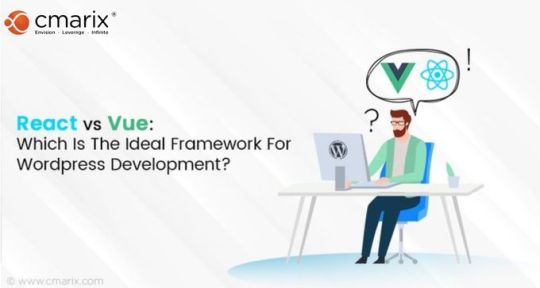
Check out who works out best for WordPress development, out of the two most popular front-end web development frameworks out there, Vue.js, and React.js. The blog reveals who delights more to WordPress developers.
#WordPress development#WordPress developers#Hire React.js Developers#Hire Vue.js Developers#Vue.js Development Company
1 note
·
View note
Note
Hi! I’m a student currently learning computer science in college and would love it if you had any advice for a cool personal project to do? Thanks!
Personal Project Ideas

Hiya!! 💕
It's so cool that you're a computer science student, and with that, you have plenty of options for personal projects that can help with learning more from what they teach you at college. I don't have any experience being a university student however 😅
Someone asked me a very similar question before because I shared my projects list and they asked how I come up with project ideas - maybe this can inspire you too, here's the link to the post [LINK]
However, I'll be happy to share some ideas with you right now. Just a heads up: you can alter the projects to your own specific interests or goals in mind. Though it's a personal project meaning not an assignment from school, you can always personalise it to yourself as well! Also, I don't know the level you are, e.g. beginner or you're pretty confident in programming, if the project sounds hard, try to simplify it down - no need to go overboard!!

But here is the list I came up with (some are from my own list):
Personal Finance Tracker
A web app that tracks personal finances by integrating with bank APIs. You can use Python with Flask for the backend and React for the frontend. I think this would be great for learning how to work with APIs and how to build web applications 🏦
Online Food Ordering System
A web app that allows users to order food from a restaurant's menu. You can use PHP with Laravel for the backend and Vue.js for the frontend. This helps you learn how to work with databases (a key skill I believe) and how to build interactive user interfaces 🙌🏾
Movie Recommendation System
I see a lot of developers make this on Twitter and YouTube. It's a machine-learning project that recommends movies to users based on their past viewing habits. You can use Python with Pandas, Scikit-learn, and TensorFlow for the machine learning algorithms. Obviously, this helps you learn about how to build machine-learning models, and how to use libraries for data manipulation and analysis 📊
Image Recognition App
This is more geared towards app development if you're interested! It's an Android app that uses image recognition to identify objects in a photo. You can use Java or Kotlin for the Android development and TensorFlow for machine learning algorithms. Learning how to work with image recognition and how to build mobile applications - which is super cool 👀
Social Media Platform
(I really want to attempt this one soon) A web app that allows users to post, share, and interact with each other's content. Come up with a cool name for it! You can use Ruby on Rails for the backend and React for the frontend. This project would be great for learning how to build full-stack web applications (a plus cause that's a trend that companies are looking for in developers) and how to work with user authentication and authorization (another plus)! 🎭
Text-Based Adventure Game
If you're interested in game developments, you could make a simple game where users make choices and navigate through a story by typing text commands. You can use Python for the game logic and a library like Pygame for the graphics. This project would be great for learning how to build games and how to work with input/output. 🎮
Weather App
Pretty simple project - I did this for my apprenticeship and coding night classes! It's a web app that displays weather information for a user's location. You can use Node.js with Express for the backend and React for the frontend. Working with APIs again, how to handle asynchronous programming, and how to build responsive user interfaces! 🌈
Online Quiz Game
A web app that allows users to take quizzes and compete with other players. You could personalise it to a module you're studying right now - making a whole quiz application for it will definitely help you study! You can use PHP with Laravel for the backend and Vue.js for the frontend. You get to work with databases, build real-time applications, and maybe work with user authentication. 🧮
Chatbot
(My favourite, I'm currently planning for this one!) A chatbot that can answer user questions and provide information. You can use Python with Flask for the backend and a natural language processing library like NLTK for the chatbot logic. If you want to mauke it more beginner friendly, you could use HTML, CSS and JavaScript and have hard-coded answers set, maybe use a bunch of APIs for the answers etc! This project would be great because you get to learn how to build chatbots, and how to work with natural language processing - if you go that far! 🤖

Another place I get inspiration for more web frontend dev projects is on Behance and Pinterest - on Pinterest search for like "Web design" or "[Specific project] web design e.g. shopping web design" and I get inspiration from a bunch of pins I put together! Maybe try that out!
I hope this helps and good luck with your project!

#my asks#resources#programming#coding#studying#codeblr#progblr#studyblr#comp sci#computer science#projects ideas#coding projects#coding study#cs studyblr#cs academia
178 notes
·
View notes
Text
Which is better full stack development or testing?

Full Stack Development vs Software Testing: Which Career Path is Right for You?
In today’s rapidly evolving IT industry, choosing the right career path can be challenging. Two popular options are Full Stack Development and Software Testing. Both of these fields offer unique opportunities and cater to different skill sets, making it essential to assess which one aligns better with your interests, goals, and long-term career aspirations.
At FirstBit Solutions, we take pride in offering a premium quality of teaching, with expert-led courses designed to provide real-world skills. Our goal is to help you know, no matter which path you choose. Whether you’re interested in development or testing, our 100% unlimited placement call guarantee ensures ample job opportunities. In this answer, we’ll explore both career paths to help you make an informed decision.
Understanding Full Stack Development
What is Full Stack Development?
Full Stack Development involves working on both the front-end (client-side) and back-end (server-side) of web applications. Full stack developers handle everything from designing the user interface (UI) to managing databases and server logic. They are versatile professionals who can oversee a project from start to finish.
Key Skills Required for Full Stack Development
To become a full stack developer, you need a diverse set of skills, including:
Front-End Technologies: HTML, CSS, and JavaScript are the fundamental building blocks of web development. Additionally, proficiency in front-end frameworks like React, Angular, or Vue.js is crucial for creating dynamic and responsive web interfaces.
Back-End Technologies: Understanding back-end programming languages like Node.js, Python, Ruby, Java, or PHP is essential for server-side development. Additionally, knowledge of frameworks like Express.js, Django, or Spring can help streamline development processes.
Databases: Full stack developers must know how to work with both SQL (e.g., MySQL, PostgreSQL) and NoSQL (e.g., MongoDB) databases.
Version Control and Collaboration: Proficiency in tools like Git, GitHub, and agile methodologies is important for working in a collaborative environment.
Job Opportunities in Full Stack Development
Full stack developers are in high demand due to their versatility. Companies often prefer professionals who can handle both front-end and back-end tasks, making them valuable assets in any development team. Full stack developers can work in:
Web Development
Mobile App Development
Enterprise Solutions
Startup Ecosystems
The flexibility to work on multiple layers of development opens doors to various career opportunities. Moreover, the continuous rise of startups and digital transformation initiatives has further fueled the demand for full stack developers.
Benefits of Choosing Full Stack Development
High Demand: The need for full stack developers is constantly increasing across industries, making it a lucrative career choice.
Versatility: You can switch between front-end and back-end tasks, giving you a holistic understanding of how applications work.
Creativity: If you enjoy creating visually appealing interfaces while also solving complex back-end problems, full stack development allows you to engage both creative and logical thinking.
Salary: Full stack developers typically enjoy competitive salaries due to their wide skill set and ability to handle various tasks.
Understanding Software Testing
What is Software Testing?
Software Testing is the process of evaluating and verifying that a software product or application is free of defects, meets specified requirements, and functions as expected. Testers ensure the quality and reliability of software by conducting both manual and automated tests.
Key Skills Required for Software Testing
To succeed in software testing, you need to develop the following skills:
Manual Testing: Knowledge of testing techniques, understanding different testing types (unit, integration, system, UAT, etc.), and the ability to write test cases are fundamental for manual testing.
Automated Testing: Proficiency in tools like Selenium, JUnit, TestNG, or Cucumber is essential for automating repetitive test scenarios and improving efficiency.
Attention to Detail: Testers must have a keen eye for identifying potential issues, bugs, and vulnerabilities in software systems.
Scripting Knowledge: Basic programming skills in languages like Java, Python, or JavaScript are necessary to write and maintain test scripts for automated testing.
Job Opportunities in Software Testing
As the demand for high-quality software increases, so does the need for skilled software testers. Companies are investing heavily in testing to ensure that their products perform optimally in the competitive market. Software testers can work in:
Manual Testing
Automated Testing
Quality Assurance (QA) Engineering
Test Automation Development
With the rise of Agile and DevOps methodologies, the role of testers has become even more critical. Continuous integration and continuous delivery (CI/CD) pipelines rely on automated testing to deliver reliable software faster.
Benefits of Choosing Software Testing
Job Security: With software quality being paramount, skilled testers are in high demand, and the need for testing professionals will only continue to grow.
Quality Assurance: If you have a knack for perfection and enjoy ensuring that software works flawlessly, testing could be a satisfying career.
Automated Testing Growth: The shift toward automation opens up new opportunities for testers to specialize in test automation tools and frameworks, which are essential for faster releases.
Flexibility: Testing provides opportunities to work across different domains and industries, as almost every software product requires thorough testing.
Full Stack Development vs Software Testing: A Comparative Analysis
Let’s break down the major factors that could influence your decision:
Factors
Full Stack Development
Software Testing
Skills
Proficiency in front-end and back-end technologies, databases
Manual and automated testing, attention to detail, scripting
Creativity
High – involves creating and designing both UI and logic
Moderate – focuses on improving software through testing and validation
Job Roles
Web Developer, Full Stack Engineer, Mobile App Developer
QA Engineer, Test Automation Engineer, Software Tester
Career Growth
Opportunities to transition into senior roles like CTO or Solution Architect
Growth towards roles in automation and quality management
Salary
Competitive with wide-ranging opportunities
Competitive, with automation testers in higher demand
Demand
High demand due to increasing digitalization and web-based applications
Consistently high, especially in Agile/DevOps environments
Learning Curve
Steep – requires mastering multiple languages and technologies
Moderate – requires a focus on testing tools, techniques, and automation
Why Choose FirstBit Solutions for Full Stack Development or Software Testing?
At FirstBit Solutions, we provide comprehensive training in both full stack development and software testing. Our experienced faculty ensures that you gain hands-on experience and practical knowledge in the field of your choice. Our 100% unlimited placement call guarantee ensures that you have ample opportunities to land your dream job, no matter which course you pursue. Here’s why FirstBit is your ideal training partner:
Expert Trainers: Learn from industry veterans with years of experience in development and testing.
Real-World Projects: Work on real-world projects that simulate industry scenarios, providing you with the practical experience needed to excel.
Job Assistance: Our robust placement support ensures you have access to job openings with top companies.
Flexible Learning: Choose from online and offline batch options to fit your schedule.
Conclusion: Which Career Path is Right for You?
Ultimately, the choice between full stack development and software testing comes down to your personal interests, skills, and career aspirations. If you’re someone who enjoys building applications from the ground up, full stack development might be the perfect fit for you. On the other hand, if you take satisfaction in ensuring that software is of the highest quality, software testing could be your calling.
At FirstBit Solutions, we provide top-notch training in both fields, allowing you to pursue your passion and build a successful career in the IT industry. With our industry-aligned curriculum, expert guidance, and 100% placement call guarantee, your future is in good hands.
So, what are you waiting for? Choose the course that excites you and start your journey toward a rewarding career today!
#education#programming#tech#technology#training#python#full stack developer#software testing#itservices#java#.net#.net developers#datascience
2 notes
·
View notes
Text
Full Stack Developer vs. Front End Developer vs. Back End Developer
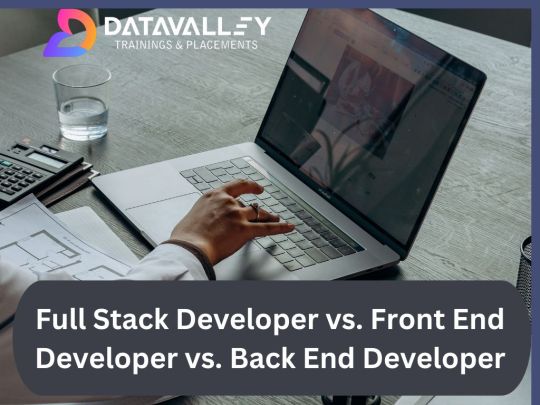
The role of a web developer is always included in the lists of high-paying IT jobs. This is because web developers are essential in today’s digital world. They create amazing websites, high-performing e-commerce sites, and other web-based applications. If you want to be a web developer, you must understand that full-stack developer skills are in great demand. However, do you understand the differences between full-stack, front-end, and back-end web development? In this post, we’ll see the differences between these three job roles, skills, and salaries.
What is Web Development?
The process of developing a website on the internet is known as web development. The non-design components of a website, such as building features and functioning with programming, markup, and scripting languages, are referred to as web development. Developers focus on technical aspects of website development such as architecture, programming, and application integration, as well as visuals.
A web developer is someone who does the following:
Creates and maintains webpages and other web-based applications.
Creates a website from a web design.
They collaborate with clients, stakeholders, and designers to understand the concept.
Can focus on frontend or backend development. Even as a full-stack developer, if necessary.
Types of Web Development
Front End Development: This aspect of web development focuses on what the user interacts with directly, i.e., the user interface of a website or web application. Front-end development deals with the design, layout, and interactivity of a site, ensuring that it’s visually appealing and user-friendly.
Back End Development: The back end is the part of a website or application that operates behind the scenes. It manages data, user authentication, and the server-side logic, ensuring the smooth functioning of the website.
Now, let’s delve into each of these roles in detail.
What is front-end development?
Front-end development, often referred to as client-side development, is the process of creating the visual elements of a website or web application that users interact with directly. It involves writing code for the user interface, optimizing website performance, and ensuring the site looks and functions correctly on various devices and browsers.
Who is a front-end developer?
A front-end developer, also known as a client-side developer, is responsible for turning web designs into a functioning website or application. They work closely with web designers and back-end developers to create an engaging and responsive user experience.
What are the front-end developer’s skills?
Front-end developers should be proficient in the following skills:
Mastery of HTML (Hypertext Markup Language) and CSS (Cascading Style Sheets) is fundamental for structuring and styling web pages.
Proficiency in JavaScript is crucial for adding interactivity and dynamic features to a website.
Knowledge of front-end frameworks like React, Angular, or Vue.js, which simplify and expedite development.
The ability to create websites that look and function well on various devices and screen sizes.
Ensuring that the website performs consistently across different browsers.
Familiarity with version control systems like Git for code management and collaboration.
Front End Developer Salary
The salary of a front-end developer can vary based on factors such as experience, location, and the company. On average, junior front-end developers can earn between $50,000 and $70,000 annually, while senior front-end developers can command salaries ranging from $90,000 to $120,000 or more.
What is Back End Development?
Back-end development, often referred to as server-side development, focuses on the server and database sides of a website or web application. It involves building and maintaining the server, databases, and applications that enable the front end to function correctly.
Who is a Back End Developer?
A back-end developer is responsible for managing the server, databases, and server-side logic of a website or application. They ensure that data is stored securely, accessed efficiently, and transmitted effectively between the front end and back end.
What are Back End Developer Skills?
Back-end developers should have expertise in the following areas:
Server-Side Programming Languages: Proficiency in languages such as Python, Ruby, Node.js, PHP, or Java is used to build server-side applications.
Databases: Knowledge of database management systems like MySQL, PostgreSQL, MongoDB, and NoSQL databases.
APIs: The ability to create and manage APIs (Application Programming Interfaces) for communication between the front end and back end.
Server Management: Skills in managing web servers and server infrastructure.
Security: Understanding web security practices and techniques to protect user data.
Version Control/Git: Proficiency in version control systems to manage and collaborate on code.
Back End Developer Salary
Back-end developer salaries can also vary based on experience, location, and the organization. Junior back-end developers can earn an annual salary ranging from $60,000 to $90,000, while senior back-end developers can expect salaries ranging from $100,000 to $150,000 or more.
Frontend vs. Backend Development
Front-end and back-end development are two halves of a whole, and they must work together seamlessly to create a functional website or application. While front-end developers focus on user interface and design, back-end developers deal with the underlying server infrastructure and data management. Both roles are essential for a successful web project.
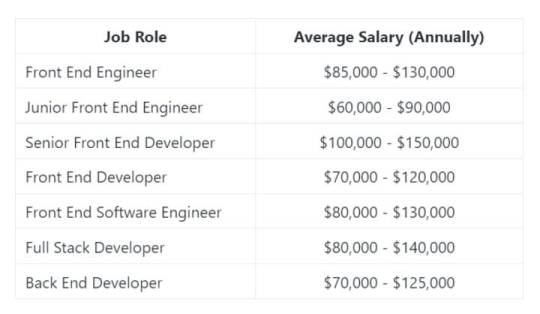
What is a Full Stack Developer?
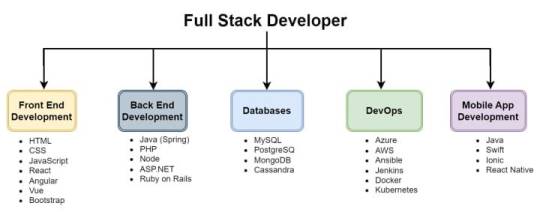
Who is a Full Stack Developer?
A full stack developer is a well-rounded professional who can take care of every aspect of web development, from designing the user interface to managing databases and server-side logic. They bridge the gap between front end and back-end development, ensuring that the entire application functions cohesively.
What are the Full Stack Developer Skills?
Full stack developers need a broad range of skills, including:
HTML/CSS: Proficiency in front end technologies for web page structuring and styling.
JavaScript: Mastery of JavaScript for creating dynamic and interactive web elements.
Front End Frameworks: Knowledge of front-end frameworks for efficient development.
Server-Side Programming Languages: Expertise in languages like Node.js, Python, Ruby, or Java for server-side development.
Databases: Proficiency in database management systems for data storage and retrieval.
APIs: Ability to create and manage APIs for communication between the front end and back end.
Version Control/Git: Familiarity with version control systems for code management.
Problem-Solving: Strong analytical and problem-solving skills to troubleshoot and optimize web applications.
Full Stack Developer Salary
Full-stack web developers are in high demand due to their range of skills and extensive knowledge. An average full stack developer’s annual salary might range from $110,000 to $150,000, based on their skill set and expertise.
Full-stack engineers earn more money than front end or back end developers. Employers agree to pay more for a full stack developer since it makes more business sense to hire one person with front and back end expertise rather than two.
As a result, the profession of a full stack developer is a profitable alternative for aspirants looking to create a career in the digital business.
The choice between becoming a full stack developer, front end developer, or back end developer depends on your interests, strengths, and career goals. Front end developers excel at creating visually appealing and user-friendly interfaces; back end developers focus on the server-side and data management; and full stack developers possess a comprehensive skill set that allows them to manage the entire development process. Each role is integral to the web development ecosystem, and the right one for you depends on your passions and aspirations within the field.
If you’re considering the path of a full stack developer and are eager to acquire the comprehensive skill set required to excel in this role, we have an excellent suggestion for you. Consider enrolling in the Full Stack Developer course at Datavalley.
Datavalley has a stellar track record of empowering aspiring developers with the knowledge and expertise to succeed in the dynamic world of web development. Their course covers everything from the fundamentals of HTML and CSS to in-depth training in JavaScript, front end and back end frameworks, and much more.
By joining Datavalley’s Full Stack Developer course, you’ll gain hands-on experience, build an impressive portfolio, and be well-prepared for a rewarding career in web development.
Don’t miss out on this opportunity to kickstart your journey as a Full Stack Developer with Datavalley. Your future in web development awaits. Take the first step today!
Attend Free Bootcamp at Datavalley
If you’re looking to supercharge your Java development skills and become a full-stack Java developer, consider joining the Java Full Stack Developer bootcamp at Datavalley. It’s an excellent opportunity to enhance your expertise and take your career to the next level.
Key points about Bootcamps:
It is completely free, and there is no obligation to complete the entire course.
20 hours total, two hours daily for two weeks.
Gain hands-on experience with tools and projects.
Explore and decide if the field or career is right for you.
Complete a mini project.
Earn a certificate to show on your profile.
No commitment is required after bootcamp.
Take another bootcamp if you are unsure about your track.
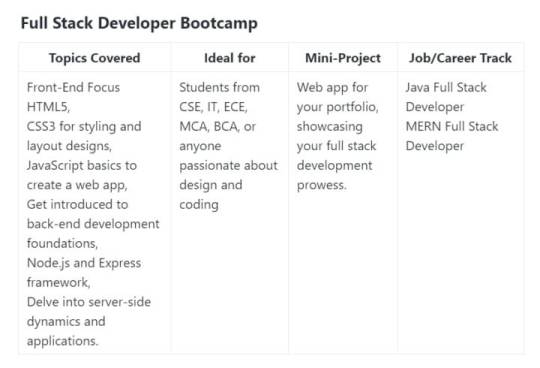
#datavalley#dataexperts#data engineering#data analytics#dataexcellence#business intelligence#data science#power bi#data analytics course#data science course#full stack course#full stack training#full stack web development#full stack developer#full stack software developer#front end developers#back end development
7 notes
·
View notes
Text
Navigating the Digital Frontier: Choosing the Right Web Development Company in India
In the rapidly evolving digital landscape, having a strong online presence is no longer optional—it's essential. Whether you're a budding startup or an established enterprise, the foundation of your online success hinges on the quality of your website. This is where choosing the best web development company in India becomes crucial.

Why India?
India has emerged as a global hub for technology and innovation, boasting a pool of highly skilled developers and cutting-edge technology solutions. Companies worldwide are turning to India for their web development needs due to its cost-effective services, timely delivery, and exceptional quality.
What to Look for in the Best Web Development Company in India
Selecting the right web development partner is a critical decision that can shape the future of your business. Here are some key factors to consider:
1. Expertise and Experience
Experience is a testament to a company's ability to deliver quality services. Look for a web development company with a robust portfolio that showcases their expertise across various industries. A company that has successfully executed diverse projects is more likely to understand and meet your unique requirements.
2. Custom Solutions
The best web development company in India will offer customized solutions tailored to your business needs. Avoid firms that rely on one-size-fits-all templates. Your website should reflect your brand's identity and cater to your target audience.
3. Technology Stack
Ensure the company is proficient in the latest technologies and development frameworks. Whether it's HTML5, CSS3, JavaScript, or advanced frameworks like React, Angular, and Vue.js, the right technology stack can significantly enhance your website's performance and user experience.
4. Client Reviews and Testimonials
Reputation matters. Check client reviews and testimonials to gauge the company's reliability and service quality. Platforms like Clutch, Upwork, and Google Reviews can provide valuable insights into the experiences of past clients.
5. Post-Launch Support
A reliable web development company doesn't just deliver the project and disappear. Look for firms that offer robust post-launch support and maintenance services to ensure your website remains up-to-date and functional.
Spotlight on Gujarat: The Best Web Development Company in Gujarat
While India, as a whole, is a powerhouse of web development talent, certain regions stand out for their exceptional contributions. Gujarat is one such region, known for its thriving IT industry and innovation-driven approach.
Why Choose a Web Development Company in Gujarat?
Skilled Workforce: Gujarat boasts a large pool of highly skilled developers who are adept at the latest technologies.
Cost-Effective Services: Companies in Gujarat offer competitive pricing without compromising on quality, making it an attractive option for businesses globally.
Robust Infrastructure: With state-of-the-art infrastructure and a conducive business environment, Gujarat is home to some of the best web development companies in India.
Conclusion
Navigating the digital frontier requires a reliable and skilled partner. Whether you're looking for the best web development company in India or the best web development company in Gujarat, the key lies in thorough research and due diligence. By focusing on expertise, customization, technology proficiency, client feedback, and post-launch support, you can ensure that your web development journey is smooth and successful.
Investing in the right web development company is not just about building a website; it's about creating a digital presence that drives growth, engages users, and stands out in a competitive market. Make your choice wisely and watch your business thrive in the digital age.
4 notes
·
View notes
Text
Vue.js is a robust front-end framework for creating dynamic, scalable web apps, making it an attractive option for organizations in 2025. The best 11 Vue.js development businesses on this list offer a range of services to meet your needs, whether you're a startup trying to create a captivating user interface or an organization looking for complicated, data-driven solutions. Read more.
0 notes
Text
Future Trends in Ruby on Rails Web Development

In the ever-evolving landscape of web development, Ruby on Rails (RoR) continues to be a popular and powerful framework for building robust, scalable, and efficient web applications. As technology advances and market demands evolve, the future of Ruby on Rails web development holds exciting possibilities and trends that promise to shape the way developers approach projects. In this article, we delve into the emerging trends and innovations in ruby on rails development company, highlighting the role of leading ruby on rails development companies, particularly those in the USA, in driving innovation and pushing the boundaries of what is possible in web development.
Embracing Modern JavaScript Frameworks:
As JavaScript frameworks like React, Vue.js, and AngularJS gain prominence in the web development landscape, Ruby on Rails developers are increasingly integrating these technologies into their projects. By leveraging the strengths of both Ruby on Rails and modern JavaScript frameworks, developers can create dynamic and interactive user interfaces that enhance the overall user experience. Ruby on Rails development companies in the USA are at the forefront of this trend, leveraging their expertise to seamlessly integrate JavaScript frameworks into RoR applications and deliver cutting-edge solutions to clients.
Microservices Architecture and Scalability:
With the growing complexity of web applications and the need for scalability and flexibility, the adoption of microservices architecture is becoming increasingly prevalent in Ruby on Rails web development. By breaking down monolithic applications into smaller, independent services, developers can achieve greater scalability, fault isolation, and agility. Leading ruby on rails web development companies in the USA are embracing microservices architecture to build scalable and resilient applications that can easily adapt to changing business requirements and user demands.
Progressive Web Applications (PWAs):
Progressive Web Applications (PWAs) represent a significant trend in web development, offering the benefits of both web and mobile applications. By leveraging modern web technologies, including service workers, web app manifests, and responsive design principles, developers can create PWAs that deliver a fast, reliable, and engaging user experience across devices and platforms. Ruby on Rails development companies in the USA are leveraging the flexibility and power of RoR to build PWAs that combine the best features of native mobile apps with the reach and accessibility of the web.
AI-Powered Applications and Chatbots:
Artificial intelligence (AI) and machine learning (ML) technologies are increasingly being integrated into web applications to enhance functionality and user experience. In Ruby on Rails web development, AI-powered applications and chatbots are becoming more prevalent, providing personalized recommendations, automated customer support, and intelligent decision-making capabilities. ruby on rails development company usa are leveraging AI and ML technologies to build sophisticated and intelligent web applications that anticipate user needs and deliver tailored experiences.
Serverless Architecture and Function as a Service (FaaS):
Serverless architecture is revolutionizing the way web applications are built and deployed, offering greater scalability, cost-efficiency, and flexibility. With the rise of Function as a Service (FaaS) platforms like AWS Lambda and Google Cloud Functions, developers can focus on writing code without worrying about managing servers or infrastructure. Leading ruby on rails development companies in the USA are embracing serverless architecture to build lightweight, event-driven applications that can scale seamlessly in response to fluctuating workloads and user demand.
Augmented Reality (AR) and Virtual Reality (VR) Experiences:
The integration of augmented reality (AR) and virtual reality (VR) technologies into web applications is opening up new possibilities for immersive and interactive user experiences. In Ruby on Rails web development, developers are exploring ways to incorporate AR and VR features into e-commerce platforms, educational portals, and entertainment websites. Ruby on Rails web development companies in the USA are at the forefront of this trend, leveraging RoR's flexibility and versatility to build immersive AR and VR experiences that push the boundaries of traditional web development.
Conclusion:
As technology continues to evolve and market demands shift, the future of Ruby on Rails web development holds immense potential for innovation and growth. By embracing emerging trends such as modern JavaScript frameworks, microservices architecture, progressive web applications, AI-powered applications, serverless architecture, and AR/VR experiences, ruby on rails web development company usa are poised to lead the way in shaping the next generation of web applications. With their expertise, creativity, and commitment to excellence, these companies are driving innovation and pushing the boundaries of what is possible in Ruby on Rails web development.
#ruby on rails development company#ruby on rails development company usa#ruby on rails web development company usa
2 notes
·
View notes
Text
#digital aptech#reactjs developers#reactjs#react.js#vuejs#hire vuejs developers#vue.js#vue.js development company#vue.js development services#react js development company#react js development services#react js web development#react js development solutions#angular js#angular#angularjs development company#angularjs developers#angularjs development services#angular js development company
0 notes
Text
The Ultimate Guide to Web Development
In today’s digital age, having a strong online presence is crucial for individuals and businesses alike. Whether you’re a seasoned developer or a newcomer to the world of coding, mastering the art of web development opens up a world of opportunities. In this comprehensive guide, we’ll delve into the intricate world of web development, exploring the fundamental concepts, tools, and techniques needed to thrive in this dynamic field. Join us on this journey as we unlock the secrets to creating stunning websites and robust web applications.
Understanding the Foundations
At the core of every successful website lies a solid foundation built upon key principles and technologies. The Ultimate Guide to Web Development begins with an exploration of HTML, CSS, and JavaScript — the building blocks of the web. HTML provides the structure, CSS adds style and aesthetics, while JavaScript injects interactivity and functionality. Together, these three languages form the backbone of web development, empowering developers to craft captivating user experiences.
Collaborating with a Software Development Company in USA
For businesses looking to build robust web applications or enhance their online presence, collaborating with a Software Development Company in USA can be invaluable. These companies offer expertise in a wide range of technologies and services, from custom software development to web design and digital marketing. By partnering with a reputable company, businesses can access the skills and resources needed to bring their vision to life and stay ahead of the competition in today’s digital landscape.
Exploring the Frontend
Once you’ve grasped the basics, it’s time to delve deeper into the frontend realm. From responsive design to user interface (UI) development, there’s no shortage of skills to master. CSS frameworks like Bootstrap and Tailwind CSS streamline the design process, allowing developers to create visually stunning layouts with ease. Meanwhile, JavaScript libraries such as React, Angular, and Vue.js empower developers to build dynamic and interactive frontend experiences.
Embracing Backend Technologies
While the frontend handles the visual aspect of a website, the backend powers its functionality behind the scenes. In this section of The Ultimate Guide to Web Development, we explore the world of server-side programming and database management. Popular backend languages like Python, Node.js, and Ruby on Rails enable developers to create robust server-side applications, while databases such as MySQL, MongoDB, and PostgreSQL store and retrieve data efficiently.
Mastering Full-Stack Development
With a solid understanding of both frontend and backend technologies, aspiring developers can embark on the journey of full-stack development as a Software Development company in USA. Combining the best of both worlds, full-stack developers possess the skills to build end-to-end web solutions from scratch. Whether it’s creating RESTful APIs, integrating third-party services, or optimizing performance, mastering full-stack development opens doors to endless possibilities in the digital landscape.
Optimizing for Performance and Accessibility
In today’s fast-paced world, users expect websites to load quickly and perform seamlessly across all devices. As such, optimizing performance and ensuring accessibility are paramount considerations for web developers. From minimizing file sizes and leveraging caching techniques to adhering to web accessibility standards such as WCAG (Web Content Accessibility Guidelines), every aspect of development plays a crucial role in delivering an exceptional user experience.
Staying Ahead with Emerging Technologies
The field of web development is constantly evolving, with new technologies and trends emerging at a rapid pace. In this ever-changing landscape, staying ahead of the curve is essential for success. Whether it’s adopting progressive web app (PWA) technologies, harnessing the power of machine learning and artificial intelligence, or embracing the latest frontend frameworks, keeping abreast of emerging technologies is key to maintaining a competitive edge.
Collaborating with a Software Development Company in USA
For businesses looking to elevate their online presence, partnering with a reputable software development company in USA can be a game-changer. With a wealth of experience and expertise, these companies offer tailored solutions to meet the unique needs of their clients. Whether it’s custom web development, e-commerce solutions, or enterprise-grade applications, collaborating with a trusted partner ensures seamless execution and unparalleled results.
Conclusion: Unlocking the Potential of Web Development
As we conclude our journey through The Ultimate Guide to Web Development, it’s clear that mastering the art of web development is more than just writing code — it’s about creating experiences that captivate and inspire. Whether you’re a novice coder or a seasoned veteran, the world of web development offers endless opportunities for growth and innovation. By understanding the fundamental principles, embracing emerging technologies, and collaborating with industry experts, you can unlock the full potential of web development and shape the digital landscape for years to come.
2 notes
·
View notes
Text
Unlocking Full-Stack Development: A Comprehensive Roadmap for Aspiring Developers in India
In the era of digital transformation, the demand for skilled full-stack developers in India is soaring. These versatile professionals proficient in both frontend and backend development are essential for building dynamic web applications. If you're aspiring to become a full-stack developer in India, this comprehensive roadmap will guide you through the steps to achieve your goal.

1. Grasp the Essentials of Web Development: To kickstart your journey as a full-stack developer, begin by mastering the core concepts of web development. Dive into HTML, CSS, and JavaScript—the fundamental languages for creating web pages. Understanding these basics lays a solid foundation for your future endeavors.
2. Select a Backend Language and Framework: Once you're comfortable with frontend technologies, delve into backend development by choosing a programming language and framework. Options like Python with Django, JavaScript with Node.js, or Ruby with Ruby on Rails are popular choices. These backend technologies empower you to handle server-side logic and data management efficiently.
3. Acquire Proficiency in Database Management: Database management is a critical aspect of full-stack development. Familiarize yourself with database systems such as MySQL, PostgreSQL, or MongoDB. Learn database querying, indexing, and normalization to effectively store and retrieve data for your web applications.
4. Explore Frontend Frameworks and Libraries: Enhance your frontend development skills by mastering popular frameworks and libraries. React.js, Angular, and Vue.js are widely used for building dynamic user interfaces. Dive deep into these tools to create interactive components and manage application state seamlessly.
5. Embrace Version Control Systems: Version control is indispensable for collaborative software development. Get hands-on experience with Git and platforms like GitHub or GitLab. Learn to create repositories, commit changes, and collaborate with other developers to streamline your workflow.
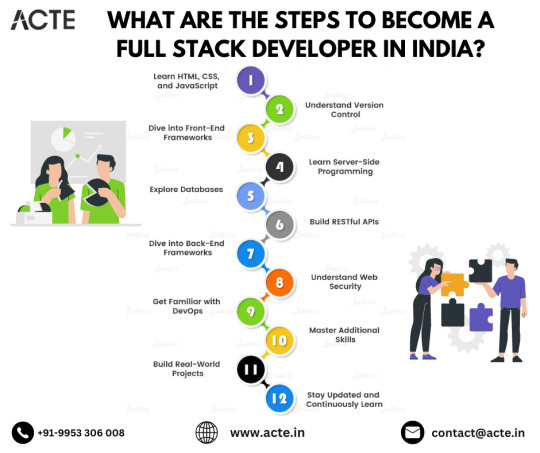
6. Sharpen Your Problem-Solving Skills: Problem-solving is a core competency for any developer. Practice solving coding challenges and algorithms on platforms such as LeetCode, HackerRank, or CodeSignal. Strengthening your problem-solving abilities will prepare you for technical interviews and real-world coding scenarios.
7. Develop Projects and Build a Portfolio: Apply your knowledge by working on diverse projects that showcase your full-stack development skills. Start with simple projects and gradually tackle more complex ones to demonstrate your proficiency. Create a portfolio website to exhibit your projects, expertise, and accomplishments to potential employers.
8. Stay Abreast of Industry Trends: The tech landscape evolves rapidly, so it's crucial to stay updated with the latest trends and technologies. Attend tech meetups, workshops, and conferences to network with industry professionals and learn from their experiences. Follow influential blogs, podcasts, and social media channels to stay informed about emerging trends and best practices.
9. Pursue Internship Opportunities: Internships provide invaluable hands-on experience and exposure to real-world projects. Look for internship opportunities at companies or startups where you can apply your skills in a professional environment. Internships also offer opportunities for mentorship and networking, which can be invaluable for your career growth.
10. Cultivate a Continuous Learning Mindset: Becoming a full-stack developer is a journey of lifelong learning and growth. Stay curious, explore new technologies, and continuously expand your skill set. Be open to adapting to new challenges and opportunities as they arise, and embrace a growth mindset to thrive in the ever-evolving tech industry.
Conclusion: Mastering full-stack development in India requires dedication, perseverance, and a commitment to lifelong learning. By following this comprehensive roadmap, you can acquire the skills and knowledge needed to excel in this dynamic and rewarding field. So, roll up your sleeves, embark on your full-stack development journey, and unlock a world of endless possibilities in India's thriving tech ecosystem.
#full stack developer#information#education#front end development#full stack web development#full stack developer course#frameworks#backend#technology#web development
2 notes
·
View notes